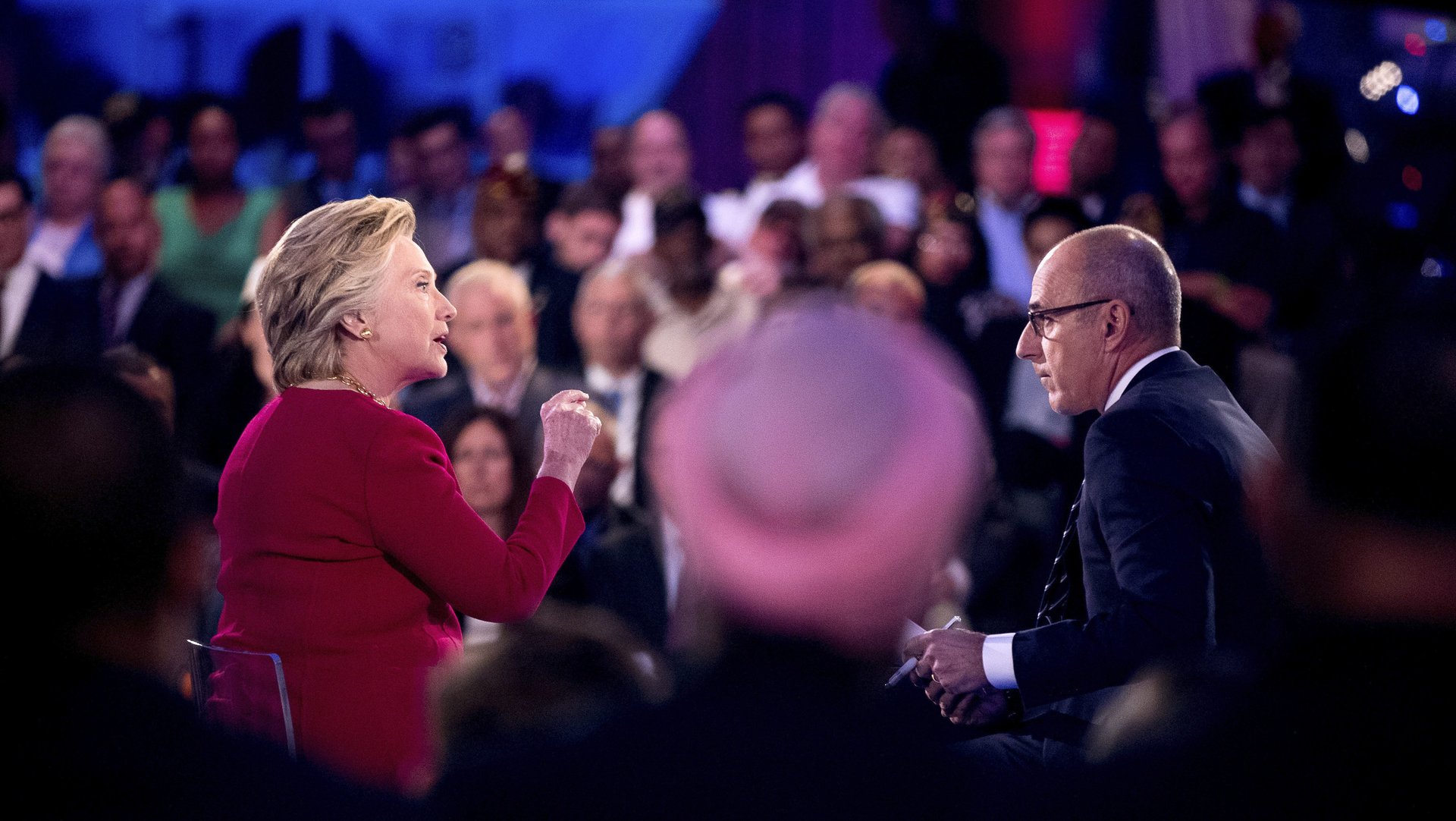Time to revisit Matt Lauer’s embarrassing, softball questioning of candidate Trump
Matt Lauer was fired from NBC News today after the network received a detailed allegation about his “inappropriate sexual behavior in the workplace.” The news was announced live on television by his former colleague and current Today host Savannah Guthrie, who read a statement from NBC News chairman Andy Lack.


Matt Lauer was fired from NBC News today after the network received a detailed allegation about his “inappropriate sexual behavior in the workplace.” The news was announced live on television by his former colleague and current Today host Savannah Guthrie, who read a statement from NBC News chairman Andy Lack.
Though it was the first complaint against Lauer in his 25-year employment at NBC, Lack said, the network “had reason to believe this may not have been an isolated incident.” Journalists at the New York Times and Variety had apparently already been reporting on allegations of sexual harassment against Lauer.
Lauer was arguably the most recognizable face at NBC News for decades. He co-hosted Today for more than 20 years, contributed to the weekly newsmagazine Dateline NBC, and assisted in the network’s political coverage, among other duties.
It’s unavoidable—and fair—to now look back at Lauer’s work through a new lens. In particular, it’s worth revisiting the spectacularly uneven presidential forum he moderated last year with then-candidates Donald Trump and Hillary Clinton.
In front of an audience of US military veterans, Lauer asked Trump and Clinton questions about foreign policy and national security in two separate 30-minute segments.
It was hard to watch.
Lauer’s journalistic missteps that night were too many to name, but these were some of the most egregious: He devoted nearly half of Clinton’s allotted time to re-litigating questions about the her private email server while she was secretary of state; he allowed Trump to lie unchecked about his support of the Iraq War; he failed to ask Trump about his criticism of the Muslim parents of a fallen US soldier, his statement that US senator John McCain was not a war hero because he was captured, any of the other malicious things Trump had said about the US military veterans, or virtually anything substantive at all; he constantly and assertively interrupted Clinton while she was speaking; and he told Clinton to respond “as briefly as you can” to an audience member’s question about the most serious decision an American commander-in-chief can make—deploying troops to war.
Lauer was called out by numerous publications (this one included) for presiding over a deeply skewed event. At the time, I blamed the disaster on “false balance,” a common type of media bias that normalizes what is not normal in an attempt to make two sides of an issue (or, in this case, two presidential candidates) appear equal:
This awkward display is the result of the American media’s obsessive, sometimes desperate, need to appear “balanced.” Perhaps out of fear that he’d be accused of bias, or out of a hope that the forum would exhibit a close, well-fought battle between two equal candidates, Lauer bungled his responsibilities as a journalist.
While that was certainly part of it, false balance might not be the whole story. Given today’s news about Lauer, we must also consider the possibility that Lauer’s decision to interrogate Clinton and kowtow to Trump was heavily gendered.
That conclusion won’t surprise many people—and indeed, several women writers recognized the sexist imbalance from the start and called it out immediately after the forum aired. Maybe it wasn’t Lauer’s conscious intent to behave unfairly toward the woman candidate (of course, maybe it was), but the result was the same. The questioning of Clinton was cynical and aggressive, while Trump was lobbed softballs about whether or not he had the temperament to be president of the United States.
Lauer, Mark Halperin, Bill O’Reilly and other prominent media figures accused of sexual misconduct were the people who helped shape the conversation around the 2016 US presidential election. And not only did they influence coverage of the election, they’ve also been shaping bigger conversations about American news, politics, and culture for decades. It’s easy now to see how Lauer’s slanted treatment of Clinton was a symptom of a disease infecting the American consciousness. It saturated networks and publications big and small. It became the predominant way to view the candidate, even among people who agreed with her on most of the issues.
This reckoning has arrived too late to give Clinton (or any woman in her field of work) a fair shake. Hopefully the next woman in Clinton’s position—regardless of political party or stature—will get one.